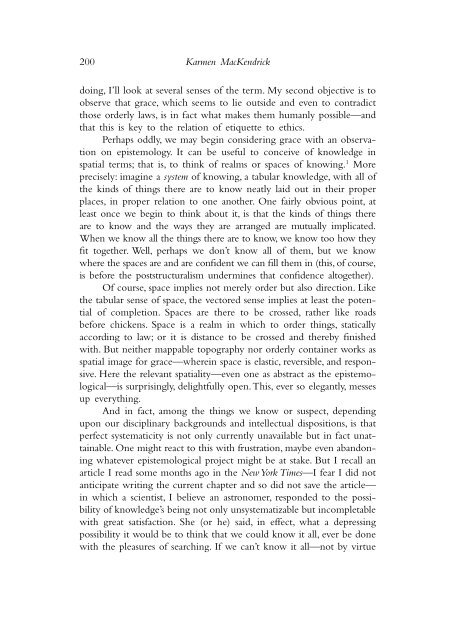You also want an ePaper? Increase the reach of your titles
YUMPU automatically turns print PDFs into web optimized ePapers that Google loves.
200 Karmen MacKendrick<br />
doing, I’ll look at several senses <strong>of</strong> <strong>the</strong> term. My second objective is to<br />
observe that grace, which seems to lie outside and even to contradict<br />
those orderly laws, is in fact what makes <strong>the</strong>m humanly possible—and<br />
that this is key to <strong>the</strong> relation <strong>of</strong> etiquette to ethics.<br />
Perhaps oddly, we may begin considering grace with an observation<br />
on epistemology. It can be useful to conceive <strong>of</strong> knowledge in<br />
spatial terms; that is, to think <strong>of</strong> realms or spaces <strong>of</strong> knowing. 1 More<br />
precisely: imagine a system <strong>of</strong> knowing, a tabular knowledge, with all <strong>of</strong><br />
<strong>the</strong> kinds <strong>of</strong> things <strong>the</strong>re are to know neatly laid out in <strong>the</strong>ir proper<br />
places, in proper relation to one ano<strong>the</strong>r. One fairly obvious point, at<br />
least once we begin to think about it, is that <strong>the</strong> kinds <strong>of</strong> things <strong>the</strong>re<br />
are to know and <strong>the</strong> ways <strong>the</strong>y are arranged are mutually implicated.<br />
When we know all <strong>the</strong> things <strong>the</strong>re are to know, we know too how <strong>the</strong>y<br />
fit toge<strong>the</strong>r. Well, perhaps we don’t know all <strong>of</strong> <strong>the</strong>m, but we know<br />
where <strong>the</strong> spaces are and are confident we can fill <strong>the</strong>m in (this, <strong>of</strong> course,<br />
is before <strong>the</strong> poststructuralism undermines that confidence altoge<strong>the</strong>r).<br />
Of course, space implies not merely order but also direction. Like<br />
<strong>the</strong> tabular sense <strong>of</strong> space, <strong>the</strong> vectored sense implies at least <strong>the</strong> potential<br />
<strong>of</strong> completion. Spaces are <strong>the</strong>re to be crossed, ra<strong>the</strong>r like roads<br />
before chickens. Space is a realm in which to order things, statically<br />
according to law; or it is distance to be crossed and <strong>the</strong>reby finished<br />
with. But nei<strong>the</strong>r mappable topography nor orderly container works as<br />
spatial image for grace—wherein space is elastic, reversible, and responsive.<br />
Here <strong>the</strong> relevant spatiality—even one as abstract as <strong>the</strong> epistemological—is<br />
surprisingly, delightfully open. This, ever so elegantly, messes<br />
up everything.<br />
And in fact, among <strong>the</strong> things we know or suspect, depending<br />
upon our disciplinary backgrounds and intellectual dispositions, is that<br />
perfect systematicity is not only currently unavailable but in fact unattainable.<br />
One might react to this with frustration, maybe even abandoning<br />
whatever epistemological project might be at stake. But I recall an<br />
article I read some months ago in <strong>the</strong> New York Times—I fear I did not<br />
anticipate writing <strong>the</strong> current chapter and so did not save <strong>the</strong> article—<br />
in which a scientist, I believe an astronomer, responded to <strong>the</strong> possibility<br />
<strong>of</strong> knowledge’s being not only unsystematizable but incompletable<br />
with great satisfaction. She (or he) said, in effect, what a depressing<br />
possibility it would be to think that we could know it all, ever be done<br />
with <strong>the</strong> pleasures <strong>of</strong> searching. If we can’t know it all—not by virtue
















